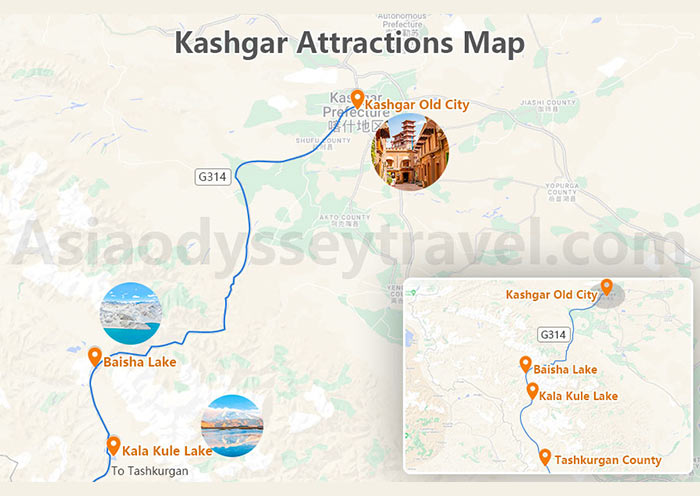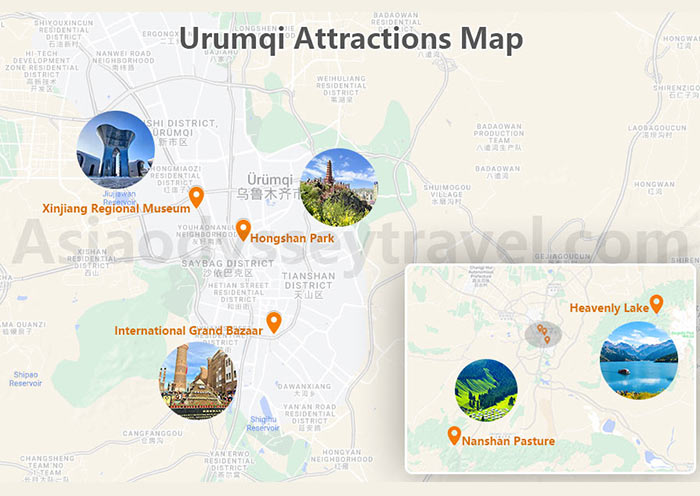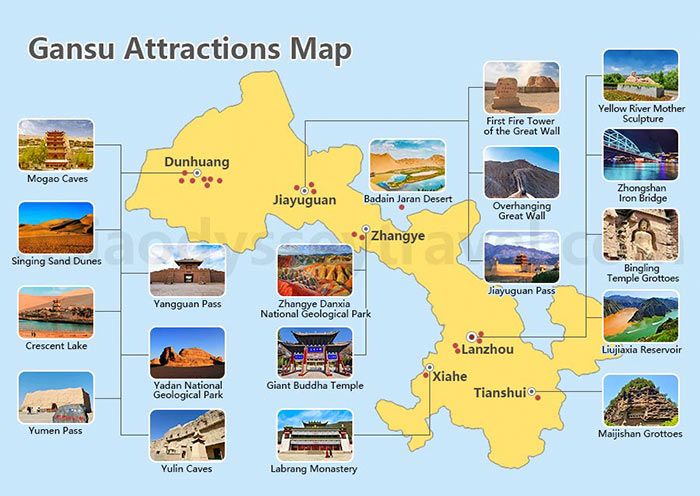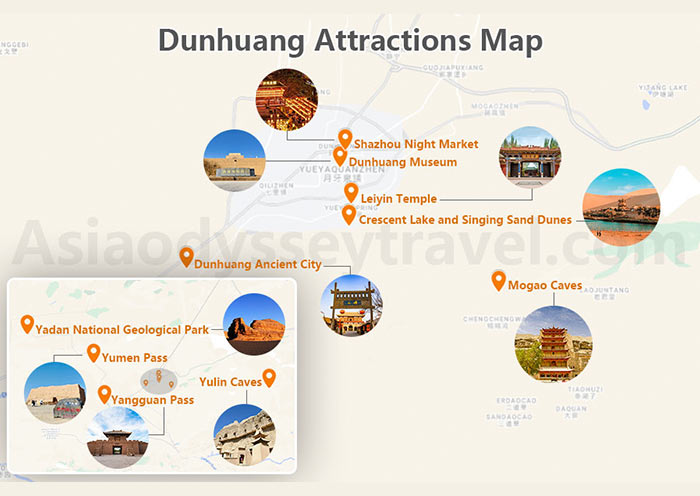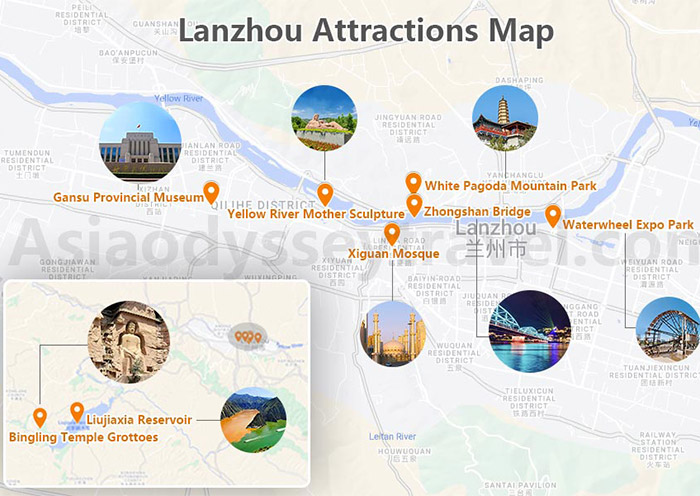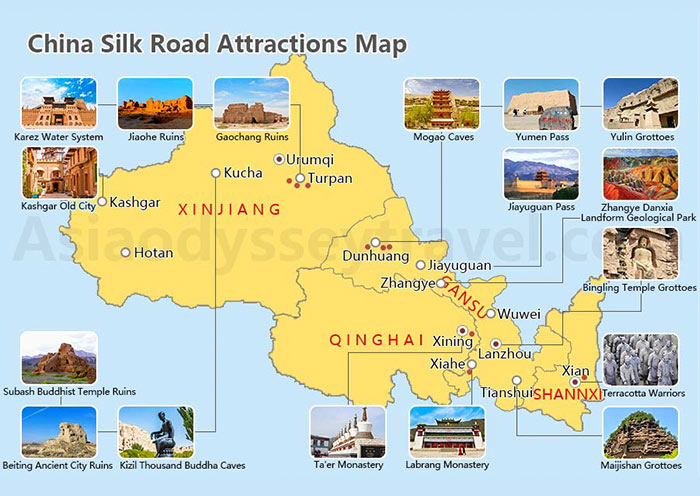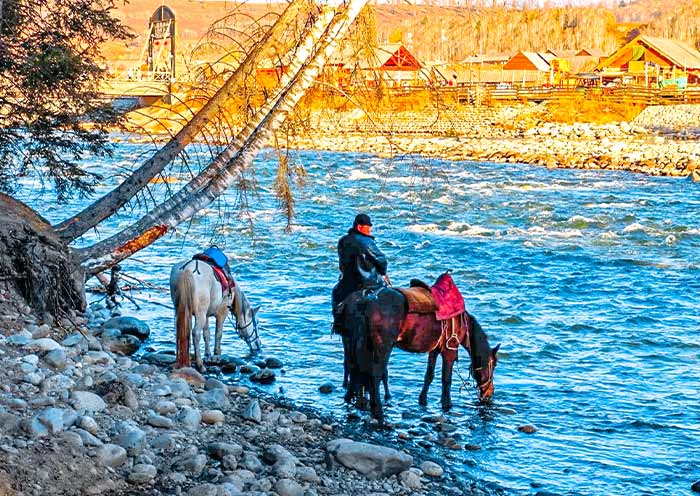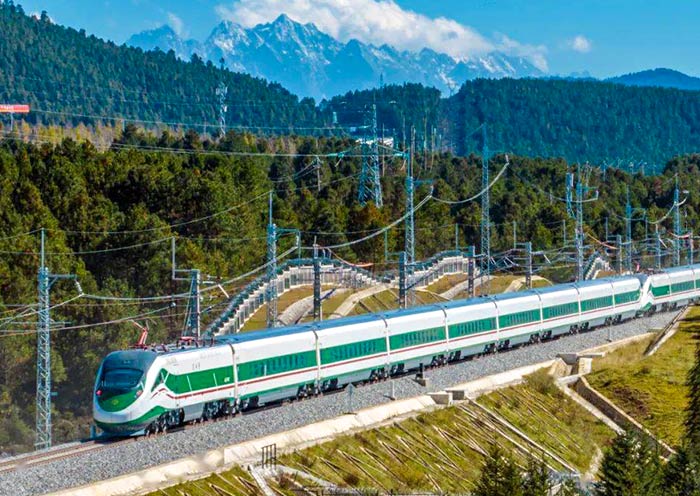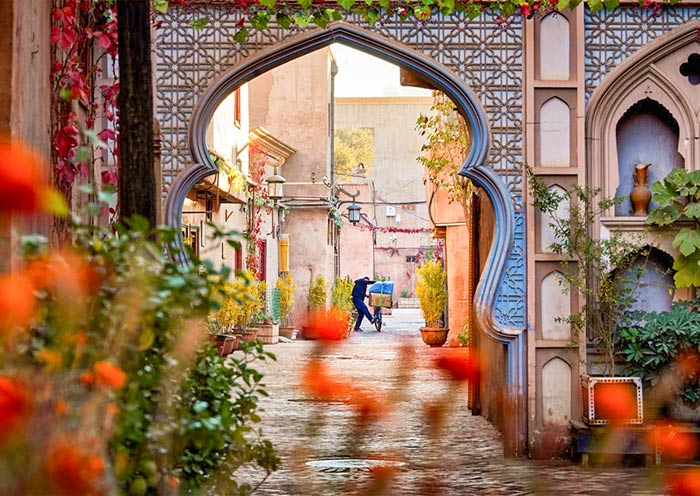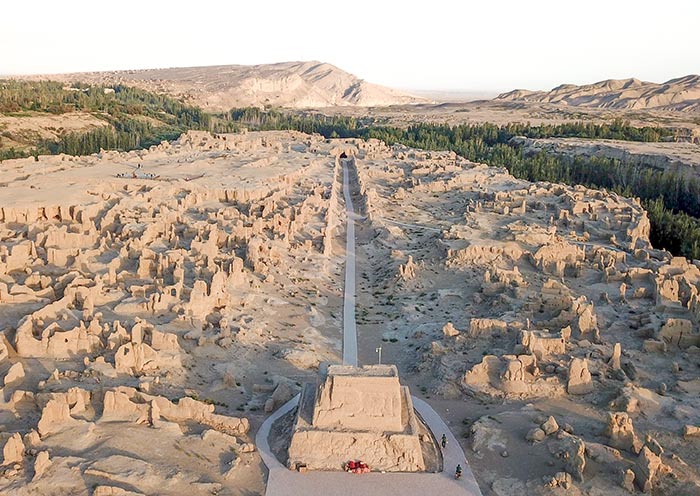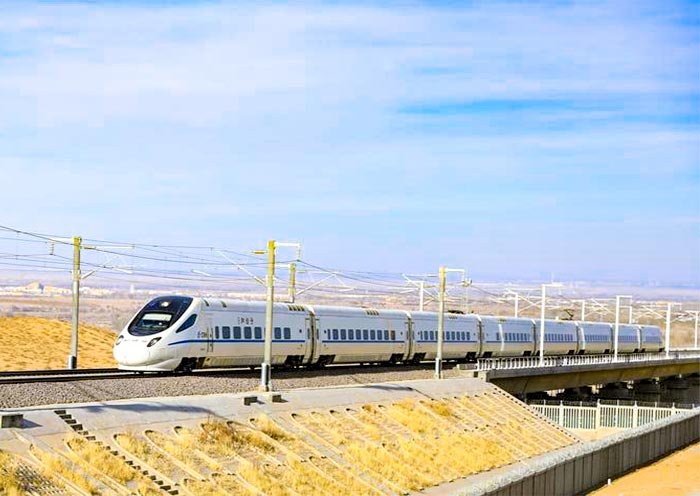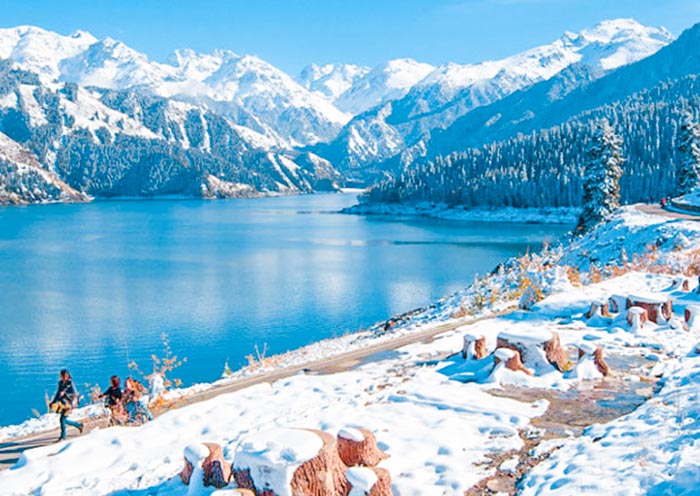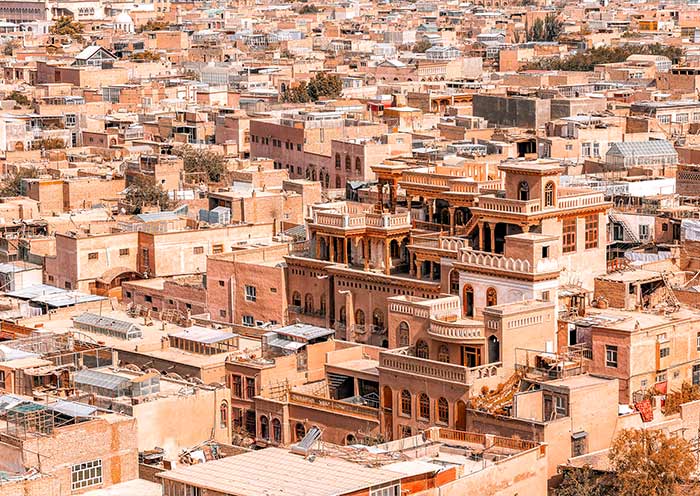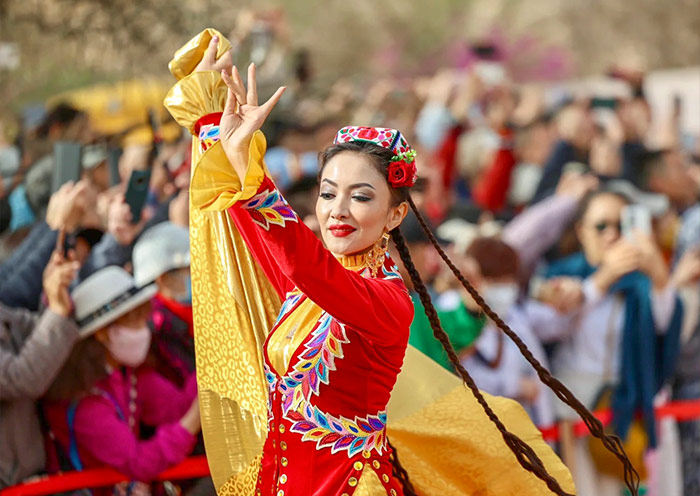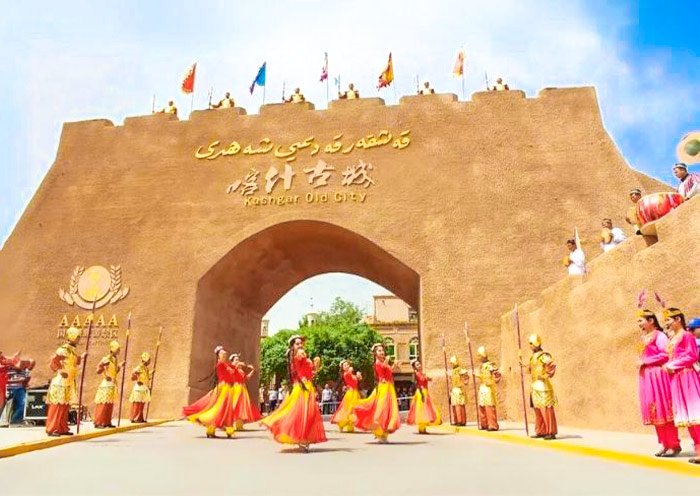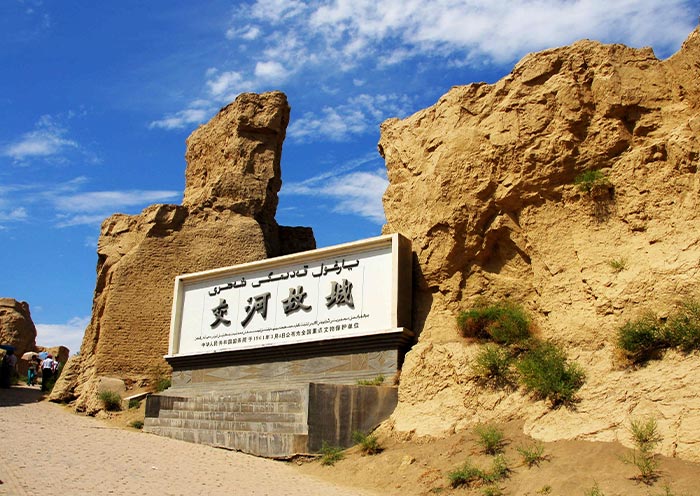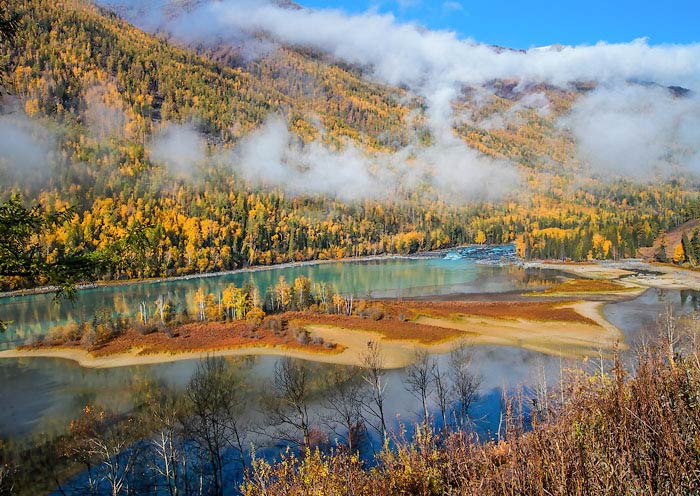Xinjiang Location Map: Where is Xinjiang Located on a Map
Xinjiang, officially known as the Xinjiang Uygur Autonomous Region, is situated in the northwest of China, bordering eight countries: Mongolia, Russia, Kazakhstan, Kyrgyzstan, Tajikistan, Afghanistan, Pakistan, and India.
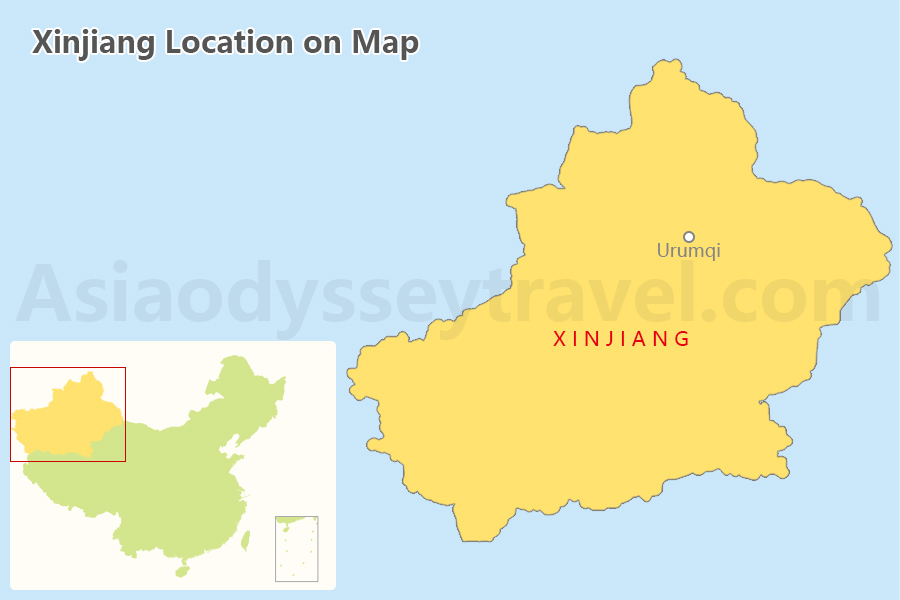
It is the largest provincial-level division in China, covering an area of over 1.6 million square kilometers. In the southeast, Xinjiang is adjacent to the Tibet Autonomous Region and Qinghai Province.
With historical significance as a vital point along the ancient Silk Road and continued importance in contemporary times, Xinjiang stands as a hub of cultural exchange and economic activity in China's far western reaches.
Xinjiang Map with Major Cities
Xinjiang, a vast and diverse region in northwestern China, is home to several fascinating cities, each with its own unique charm and attractions. Here are some of the most famous cities in Xinjiang:
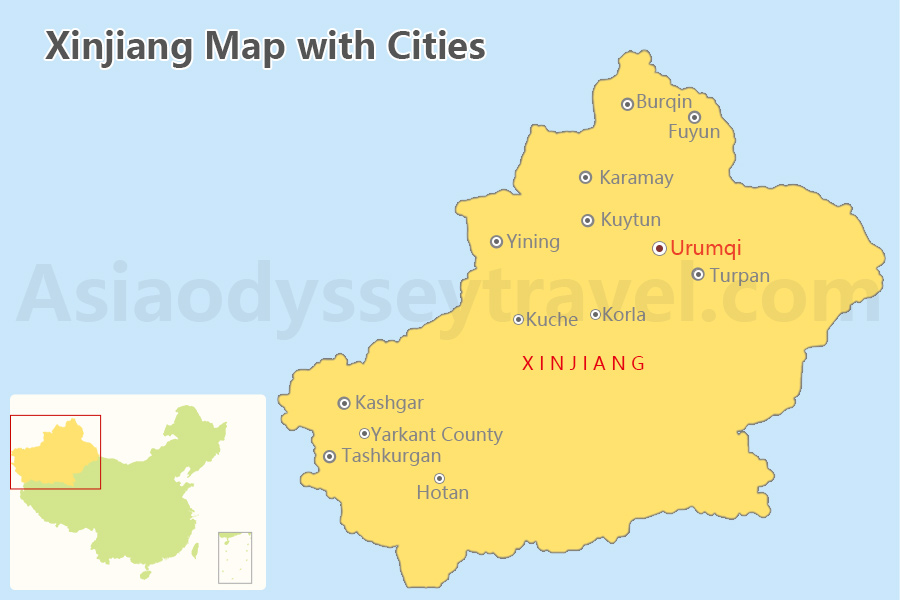
Urumqi (乌鲁木齐): The capital of Xinjiang, Urumqi is a bustling metropolis with a blend of modern and traditional elements. It serves as a gateway to the region and offers a variety of attractions, including the Red Mountain Park, the Xinjiang Museum, and the International Bazaar.
Kashgar (喀什): Known as the "Pearl of the West," Kashgar is a historic city with a vibrant culture. It is famous for its Sunday Bazaar, one of the largest bazaars in Central Asia, where you can find a wide range of local products, handicrafts, and souvenirs.
Turpan (吐鲁番): Turpan is an oasis city located in a depression below sea level, making it one of the hottest places on Earth. Despite its extreme climate, Turpan boasts stunning vineyards, ancient ruins, and the iconic Flaming Mountain.
Burqin (布尔津): Serving as the gateway to Kanas Lake, Burqin is surrounded by scenic wonders like the colorful Five-Colored Beach, inviting visitors to explore the pristine beauty of the region.
Fuyun (富蕴): Known as the gateway to Keketuohai, Fuyun offers access to this picturesque area, known for its stunning landscapes and outdoor recreational opportunities.
Karamay (克拉玛依): Karamay often referred to as the "Black Oil City," is a unique destination in Xinjiang, known for its oil industry and modern urban development.
Kuytun (奎屯): Starting point of Duku Highway. Home to the Dushanzi Grand Canyon, Kuytun offers visitors the chance to witness the breathtaking natural beauty of this region through its unique geological formations.
Yining (伊宁): Often referred to as the "Little Switzerland of China," Yining is a picturesque city surrounded by mountains and lakes. It is known for its beautiful scenery and diverse ethnic cultures.
Tashikurgan (塔县): Located near the border with Kazakhstan, Tacheng is a popular destination for outdoor activities such as skiing, hiking, and fishing. It is also known for its beautiful scenery and diverse ethnic cultures.
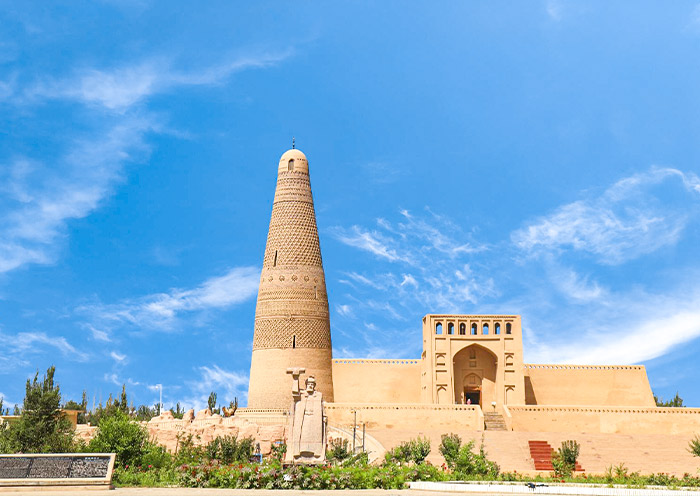
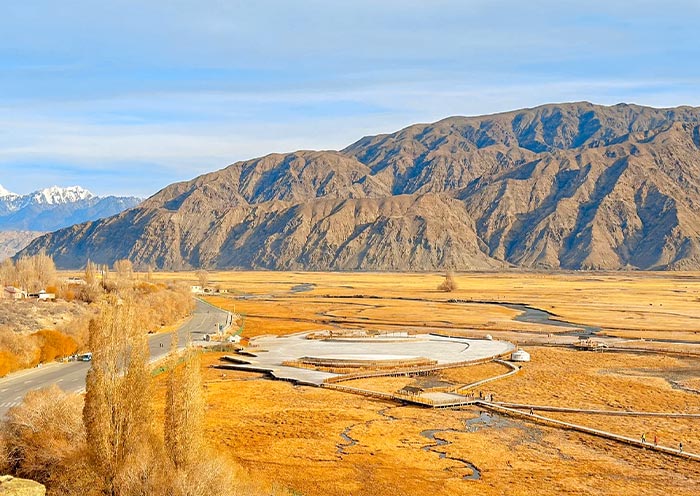
Hotan (和田): Renowned for its jade production, silk industry, and historical sites like the Niya Ruins and the White Jade River.
Yarkant (莎车县): Yarkant County is famous for its silk production, traditional Uyghur crafts, and historical sites like the Yarkant King's Mausoleum and the Yarkant Old Town, providing a window into the region's cultural heritage.
Kuche (库车) : Kuche is located in southern Xinjiang and it was an important stop along the Silk Road. Known for its rich history and cultural heritage, Kuche is home to many ancient buildings, sites, and historical cultural landmarks such as the Kuqa Grand Canyon.
Korla (库尔勒): Korla is a city with a long history, unique natural landscapes, and rich cultural heritage. Surrounding areas of Korla boast vast grasslands and stunning views of the Tianshan Mountains, making it an ideal destination to explore the scenery and culture of northern Xinjiang.
These are just a few of the many fascinating cities in Xinjiang. Each city offers unique experiences and attractions, making it a great destination for travelers seeking adventure, culture, and natural beauty.
Xinjiang Tourist Map: Xinjiang Map with Top Attractions
Xinjiang, a vast and diverse region in northwestern China, offers a wide range of attractions for visitors. Here are some of the top attractions in Xinjiang:
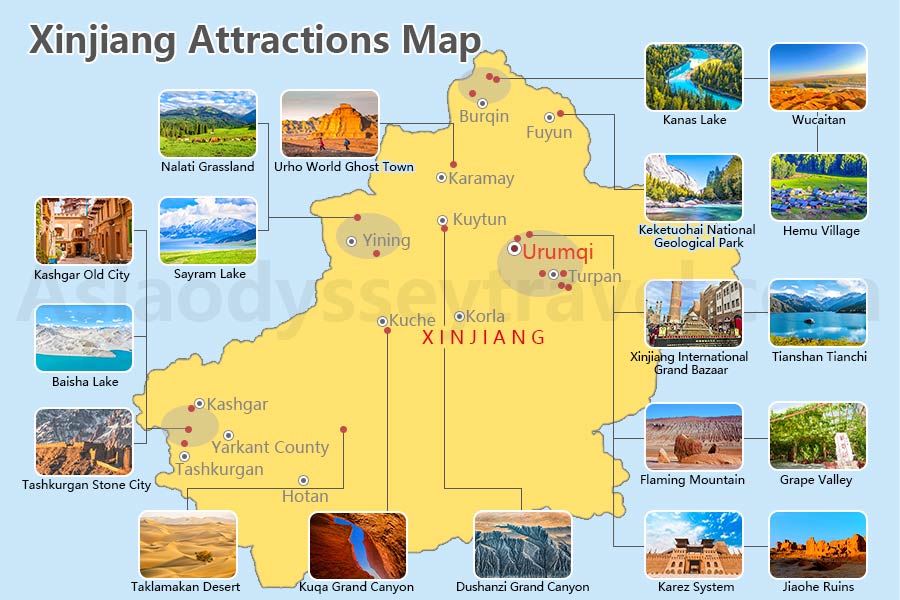
Northern Xinjiang Area
Kanas Lake: A stunning alpine lake surrounded by lush forests and snow-capped mountains.
Tianshan Tianchi Lake: A celestial gem nestled in the Tian Shan Mountains, offering breathtaking scenery and a serene atmosphere.
Urho World Ghost Town: Also known as the "Ghost Town," this unique geological formation is located near the city of Karamay. The wind and rain have eroded the sandstone and mudstone into bizarre shapes, resembling a medieval city.
Xinjiang International Grand Bazaar: A vibrant marketplace in Urumqi where you can experience the local culture, shop for traditional goods, and sample delicious Xinjiang cuisine.
Keketuohai National Geological Park: Keketuohai National Geological Park is a beautiful and rugged canyon with striking rock formations and rich mineral deposits. It's a great destination for exploring and enjoying outdoor activities amidst stunning natural beauty.
Wucaitan (Five-Colored Beach): Wucaitan is renowned for its stunning sandstone landscape that exhibits a dazzling array of colors, ranging from reds and oranges to yellows and blues.
Hemu Village: A picturesque village nestled in the Kanas Nature Reserve, known for its traditional wooden houses and stunning scenery.
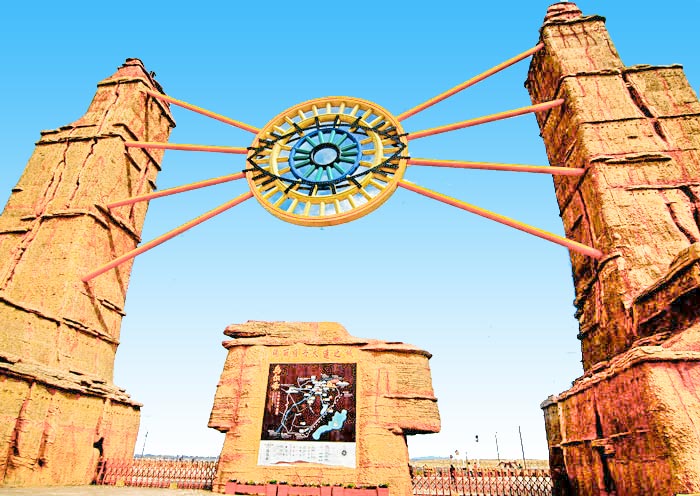
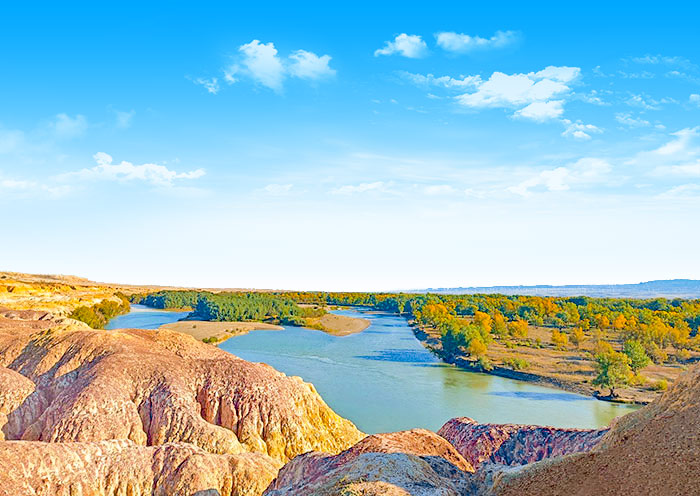
Southern Xinjiang Area
Taklamakan Desert: The second-largest desert in the world, offering a challenging and adventurous experience for those who dare to explore it.
Kashgar Old City: A vibrant and bustling marketplace with traditional Uyghur architecture and a rich cultural heritage.
Kuqa Grand Canyon (库车大峡谷): Carved by the Kuqa River over millions of years, this canyon is a geological marvel. It features towering cliffs, deep gorges, and colorful rock formations.
Tashkurgan Stone City (塔县石头城): An ancient stone fortress located in Tashkurgan County, showcasing the region's rich history and unique architecture.
Baisha Lake (白沙湖): A serene lake near Tashkorgan with crystal-clear waters surrounded by snow-capped mountains, offering a peaceful retreat in nature.
Eastern Xinjiang Area
Flaming Mountain: A unique geological formation known for its reddish-brown color and ability to reflect sunlight.
Karez System: An ancient underground water system in Turpan, showcasing the sophisticated irrigation techniques used in the region for centuries.
Jiaohe Ancient City: A well-preserved archaeological site that offers a glimpse into the Silk Road era.
Dushanzi Grand Canyon (独山子大峡谷): A spectacular canyon near Karamay with towering cliffs, winding rivers, and stunning rock formations, perfect for hiking and photography.
Grape Valley: Enjoy the vineyards and fruit orchards in Turpan, famous for its grapes and other agricultural products.
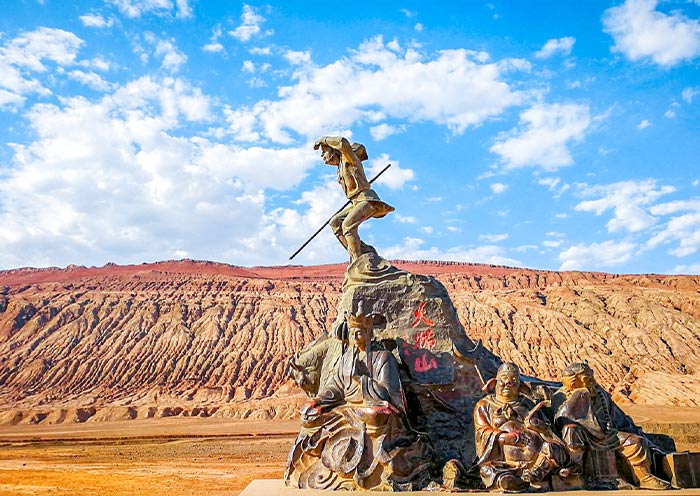
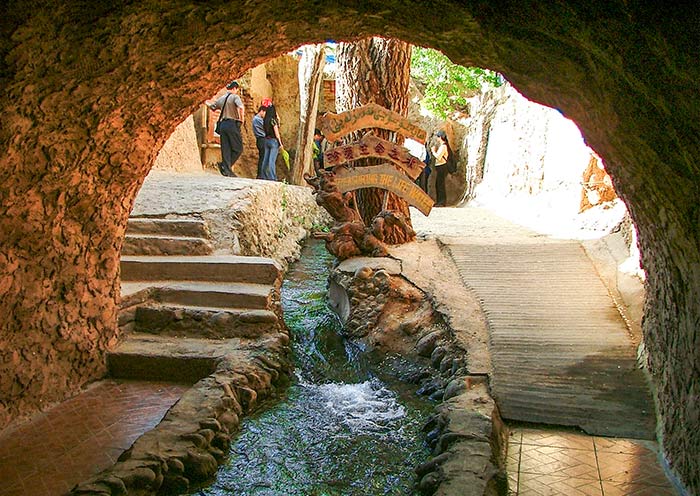
Ili Area
Sayram Lake (赛里木湖): Known as the "God's Lake," Sayram Lake is a high-altitude alpine lake located in the Bortala Mongolian Autonomous Prefecture. Its crystal-clear waters reflect the surrounding mountains, creating a breathtaking mirror effect.
Nalati Grassland (那拉提草原): This vast grassland is often referred to as the "Switzerland of Xinjiang." It's characterized by rolling hills, lush meadows, and herds of grazing livestock. Visitors can enjoy horseback riding, hiking, and camping.
These are just a few of the many attractions that Xinjiang has to offer. With its diverse landscapes, rich history, and vibrant culture, Xinjiang is a destination that will leave you with unforgettable memories.
Xinjiang Map with Airports & Train Stations
Main Airports in Xinjiang, China
In the Xinjiang Uygur Autonomous Region, there are a total of 25 airports, making it the province with the most airports in China. Among them are two international airports, which are also the most important transportation hubs: Urumqi Diwopu International Airport and Kashi Laining International Airport. Check Xinjiang airports map with brief descriptions:
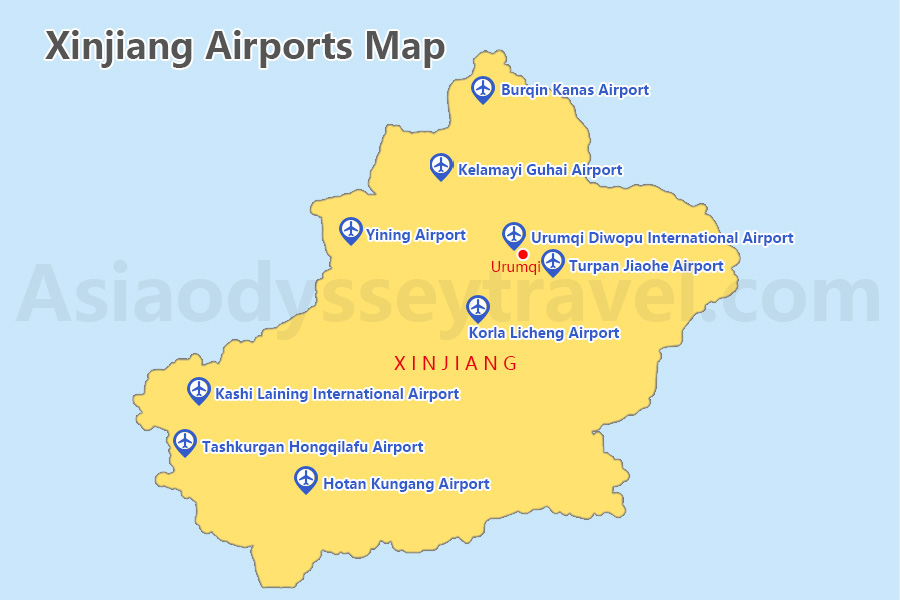
- Urumqi Diwopu International Airport: The primary gateway to Xinjiang, this airport connects the region to major cities in China and around the world.
- Kashi Laining International Airport: A significant international airport serving the southern part of Xinjiang, providing connections to various destinations.
- Turpan Jiaohe Airport: Located near the historic Silk Road city of Turpan, this airport serves as a gateway to the region's vineyards and ancient sites.
- Burqin Kanas Airport: Serves the Kanas Lake region, a popular tourist destination with stunning natural beauty.
- Korla Licheng Airport: A major transportation hub in Xinjiang, connecting the region to other cities in China.
- Yining Airport: Located in Yining City, a popular tourist destination known for its Ili River Valley and Kazakh culture in Central Xinjiang.
- Hotan Kungang Airport: Serves the southern part of Xinjiang, providing access to the Taklamakan Desert and other attractions.
- Kelamayi Guhai Airport: Located in Karamay City, a major oil and gas production center in Xinjiang.
- Xinyuan Nalati Airport: Serves the Nalati Valley, a scenic area known for its alpine meadows and forests.
- Tashkurgan Hongqilafu Airport: Located in Tashkurgan Tajik Autonomous County, a border town with Pakistan.
This extensive network of airports ensures convenient connectivity within Xinjiang and beyond, making it easier for travelers to explore the region's diverse attractions and experiences.
Main Railway Stations in Xinjiang, China
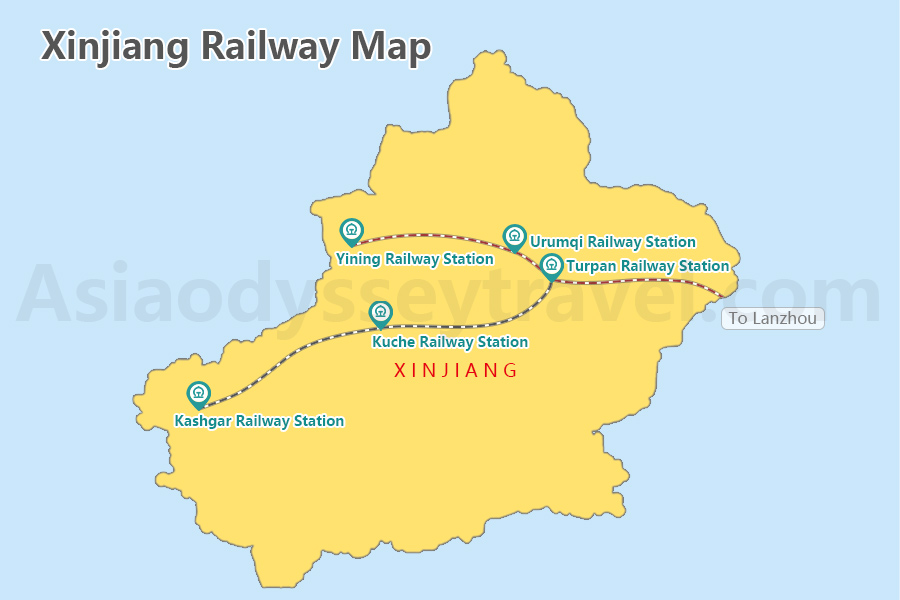
- Urumqi Railway Station:
Location: Urumqi, the capital of Xinjiang Uyghur Autonomous Region.
- Kashgar Railway Station:
Location: Kashgar, a historic city in southern Xinjiang near the borders of Tajikistan, Pakistan, and Kyrgyzstan.
- Turpan Railway Station:
Location: Turpan, a city known for its unique geography and historical sites in eastern Xinjiang.
- Kuche (Kuqa) Railway Station:
Location: Kuche, also known as Kuqa, a city with rich cultural heritage in southern Xinjiang.
- Yining Railway Station:
Location: Yining, a city in the Ili Kazakh Autonomous Prefecture of Xinjiang.
Xinjiang Travel Map & Travel in Xinjiang with Map
Northern Xinjiang Travel Map
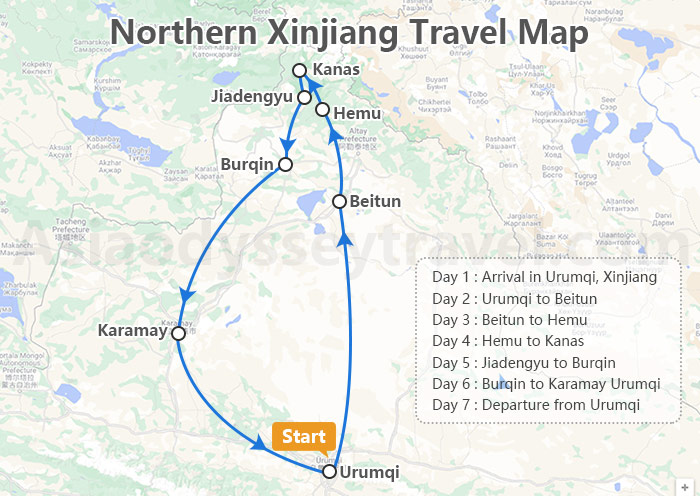
Day 1: Arrival in Urumqi, Xinjiang: Arrive in Urumqi, Xinjiang, where you will be greeted with airport pickup services and assisted with check-in procedures at your hotel for a comfortable stay.
Day 2: Urumqi to Beitun: Explore the stunning Heavenly Lake in the Tianshan Mountains and enjoy the breathtaking landscapes of the Bogda Mountains in Beitun.
Day 3: Beitun to Hemu: Visit the picturesque village of Hemu, interact with the local Tuva community, and witness the beauty of the sunset over the landscape.
Day 4: Hemu to Kanas: Experience the sunrise in Hemu Village, explore the mystical Kanas Lake, and visit the Three Bays area before heading to Jiadengyu.
Day 5: Jiadengyu to Burqin: Witness the unique beauty of the Five-Colored Beach in Burqin before departing from Urumqi.
Day 6: Burqin to Karamay Urumqi: Explore the eerie landscape of the Ghost City in Wuerhe near Karamay before returning to Urumqi.
Day 7: Departure from Urumqi: Check out from your hotel in Urumqi and receive assistance with transfer to the airport for your departure, concluding your memorable journey through Xinjiang.
Southern Xinjiang Travel Map
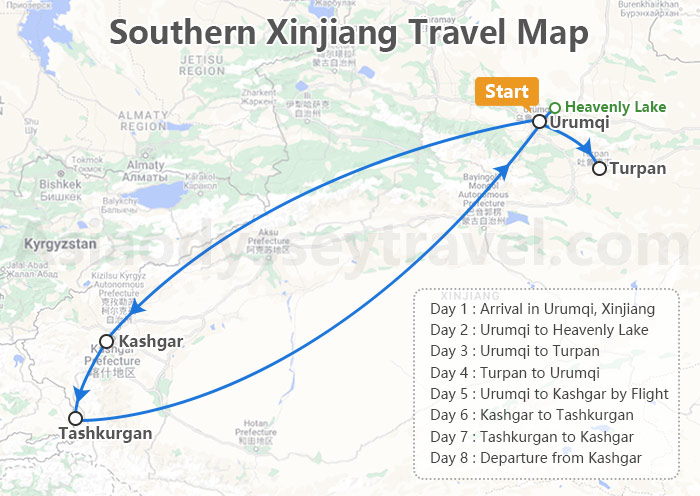
Day 1: Arrival in Urumqi: Arrive in Urumqi where you will be met at the airport for transfer to your accommodation. Complete check-in procedures and relax after your journey.
Day 2: Urumqi to Heavenly Lake: Visit the picturesque Heavenly Lake in the Tianshan Mountains, followed by a trip to the Xinjiang Regional Museum to immerse yourself in the history and culture of the region.
Day 3: Urumqi to Turpan: Journey to Turpan, passing by the iconic Flaming Mountains. Explore the charming village of Tuyugou and marvel at the ancient Bezeklik Thousand Buddha Caves.
Day 4: Turpan to Urumqi: Discover the ancient ruins of Jiaohe at the Jiaohe Ancient City site. Explore the remarkable Karez Water System and admire the architectural beauty of the Emin Minaret before returning to Urumqi.
Day 5: Urumqi to Kashgar by Flight: Fly to Kashgar and delve into the historic Kashgar Old City, visiting landmarks like the Id Kah Mosque and ancient tea houses. Explore the Livestock Market if it falls on a Sunday.
Day 6: Kashgar to Tashkurgan: Travel along the breathtaking Karakoram Highway, passing through the Pamir Plateau. Stop by scenic spots like White Sand Lake and Karakul Lake, and experience the hospitality of a Tajik family.
Day 7: Tashkurgan to Kashgar: Explore the ancient Stone City of Tashkurgan and enjoy the vastness of the Alar grasslands before returning to Kashgar.
Day 8: Departure from Kashgar: Check out from your hotel in Kashgar and transfer to the airport for your onward journey, bidding farewell to the enchanting city of Kashgar.
